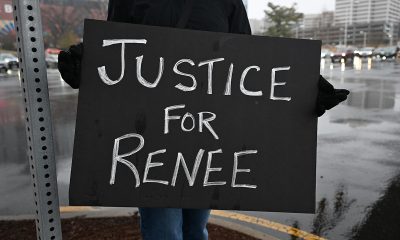South America
Transgender Brazilian government official travels to D.C.
Symmy Larrat sat down with the Washington Blade on June 16
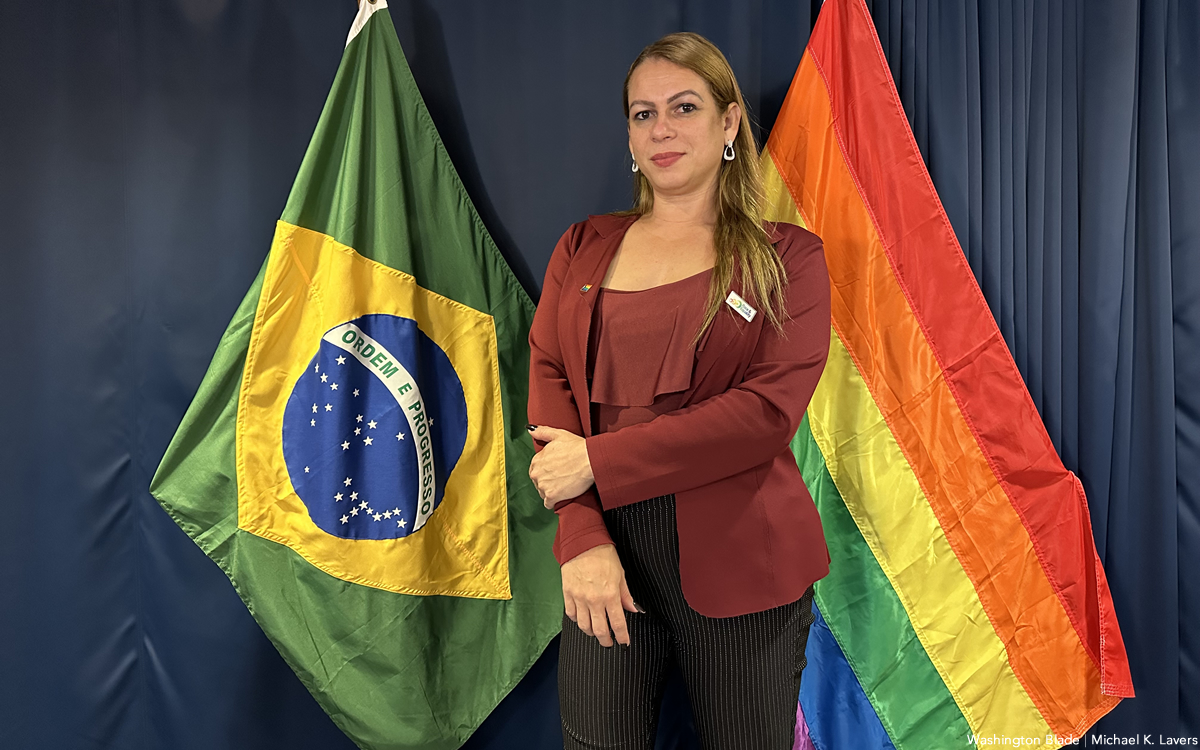
A transgender woman who is a member of Brazilian President Luiz Inácio Lula da Silva’s government said the storming of her country’s Congress, Presidential Palace and Supreme Court in January sparked outrage among many Brazilians.
Symmy Larrat, who is Brazil’s National Secretary for the Promotion and Defense of the Rights of LGBTQIA+ People, spoke exclusively with the Washington Blade on June 16. She was in D.C. to participate in an Institute on Race, Equality and Human Rights conference.
Thousands of supporters of former President Jair Bolsonaro on Jan. 8 stormed the country’s Congress, Presidential Palace and Supreme Court.
Da Silva took power a week before the insurrection. His predecessor, who did not accept last October’s election results, was in Florida when Da Silva took office.
Bolsonaro has since returned to Brazil.
“There are two aspects of Jan. 8. The first that scares me the most is people now think we won the election and we’re set and nobody protected themselves against what happened,” Larrat told the Blade, speaking through a Brazilian Embassy staffer who translated for her. “That moment signaled for all of us how absurd the extremists are. The other side doesn’t respect the democratic system.”
“On the other hand it showed Brazil that what we were denouncing as a very aggressive posture was a reality,” she added. “Brazilians are very patriotic and people felt offended by it.”
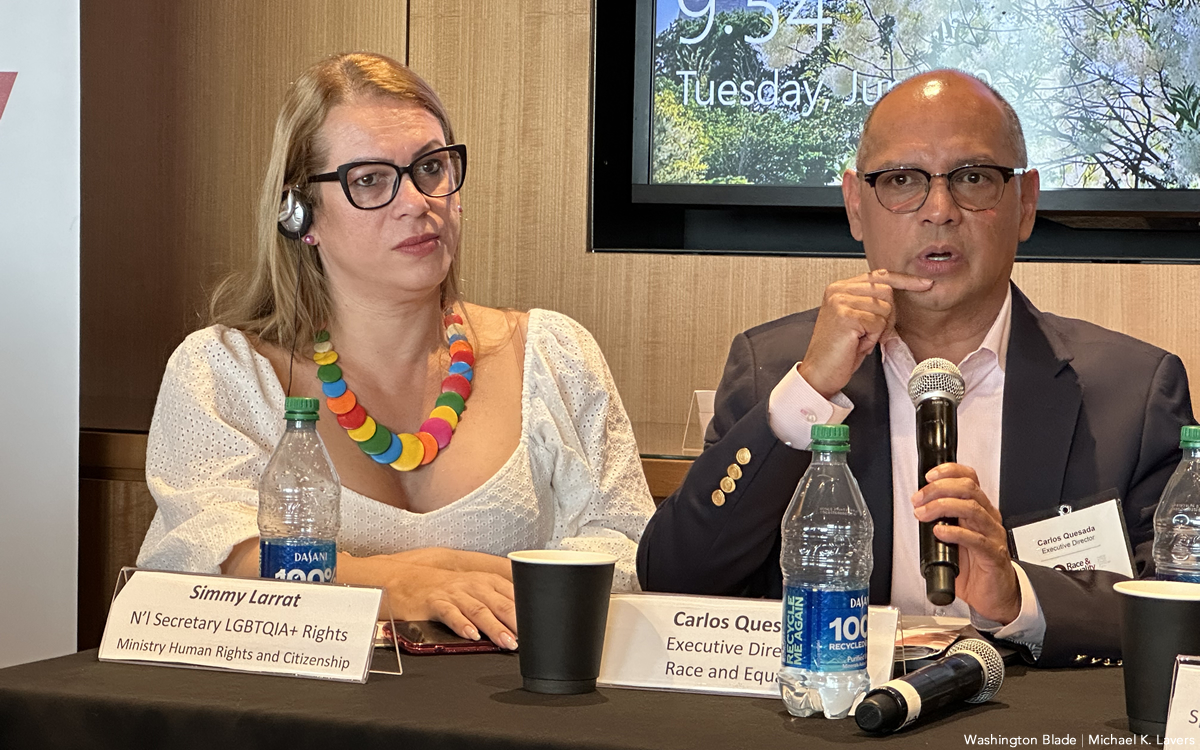
Larrat was born and raised in Belém, a city near the mouth of the Amazon River in the country’s Pará state.
Her parents were history teachers, and she said that’s why she “always had this questioning, curiosity” about different social justice movements. Larrat studied communications at the Federal University of Pará and her advocacy began with what she described to the Blade as “the democratization of communication structures and networks.”
Larrat later became an LGBTQ and intersex rights activist.
She organized Pride parades, helped establish NGOs and founded a shelter and community center for vulnerable LGBTQ and intersex people. Larrat told the Blade she responded to the lack of support for LGBTQ and intersex people in Belém and throughout the Brazilian Amazon.
“That’s what made me sense the necessity of justice and inequality because of the lack of support for LGBT people in the Amazon is just one of the things that we lack in the region,” she said. “It’s a region with a lack of information, technology. It’s a very colonized region in the worst sense of the word; not colonized only by the world, but also colonized by Brazil, the lack of policies for development.”
“It is a region that is very rich with a very poor population, so there is still an extractivist logic. that we develop consumer products and we feed the international regions, but we don’t benefit from what is created,” she added, noting it is often to travel from São Paulo to other countries than it is to fly from the country’s commercial capital to Belém and other cities in the Amazon. “The access is difficult. You don’t have access to medical care, information technology. There’s a lot of difficult access to information and information technology.”
Larrat said she knew she “had a feeling as a teenager that I was transgender, but at that time I didn’t see transgender people in places of power.”
Brazilian model Roberta Close, who is trans, was well-known throughout the country in the 1980s. Larrat said trans people at that time were prominent in Brazilian media and art, but “mostly in a pejorative way.”
“I had the conscience that I needed to study, to take myself out of this situation of vulnerability, so I had to study,” she said.
Larrat came out as trans when she was 30.
She was already active in various social movements, but she engaged in sex work “to survive.” Larrat said her family kicked her out of their home when she was a teenager, but she “reconnected with” her mother after she transitioned. Larrat told the Blade that her family now accepts her gender identity.
“The truth was what I was saying gave her (my mother) an understanding of my suffering and then she accompanied me with all my transitioning processes and that made her understand and she got scared about aggressions that I may suffer from society,” she said. “That’s when we reconnected, with her and with all of her family. Today they’re very accepting of it.”
Bolsonaro government was ‘terrifying’
Former President Dilma Rousseff’s government in 2013 invited Larrat to join the country’s Human Rights Ministry as an assistant for LGBTQ and intersex rights. Larrat joked she “was prostituting myself at night … and the next night I went to Brasília to go to the federal government.”
“That’s exactly what happened,” she said.
Larrat left the government once Rousseff was impeached in 2016.
Bolsonaro, a former congressman and former Brazilian Army captain, took office in 2019. He faced sharp criticism because of his rhetoric against LGBTQ and intersex Brazilians, women, people of African and indigenous descent and other groups.
The former president, among other things, encouraged fathers to beat their sons if they came out as gay. A Brazilian Federal Police investigator last August called for prosecutors to charge Bolsonaro with incitement for spreading false information about COVID-19 after he said people who are vaccinated against the virus are at increased risk for AIDS.
“It was terrifying to be there during the Bolsonaro government because we were seeing the public policies all being deconstructed, being destroyed,” said Larrat. “We knew the impacts of it on the lives of people, but it was a shock to all of us the institutionalization of hate speech.”
Larrat further stressed the majority of Brazilians do “not agree with the hate speech, but they are influenced by it.” Larrat also said this hate speech — “we have to protect our children. I can be who I am, but I cannot be it in front of children” — is part of a larger strategy to make Brazilians afraid of LGBTQ and intersex people.
“It’s speech that paints us as a menace and puts fear in people,” she said.

Brazil’s Supreme Electoral Tribunal on Friday banned Bolsonaro from running for office until 2030. The Associated Press noted five of the court’s seven judges agreed the former president used “official communications channels to promote his campaign” and spread disinformation about last year’s election.
Larrat admitted the 2022 campaign was “very difficult” for Brazil. She stressed Da Silva won, in part, because he believes in democracy.
“The power of dialogue that he has is impressive; the capacity to speak to everybody, to speak with both sides on each day,” said Larrat. “He negotiates with both sides. He’s a very good political articulator.”
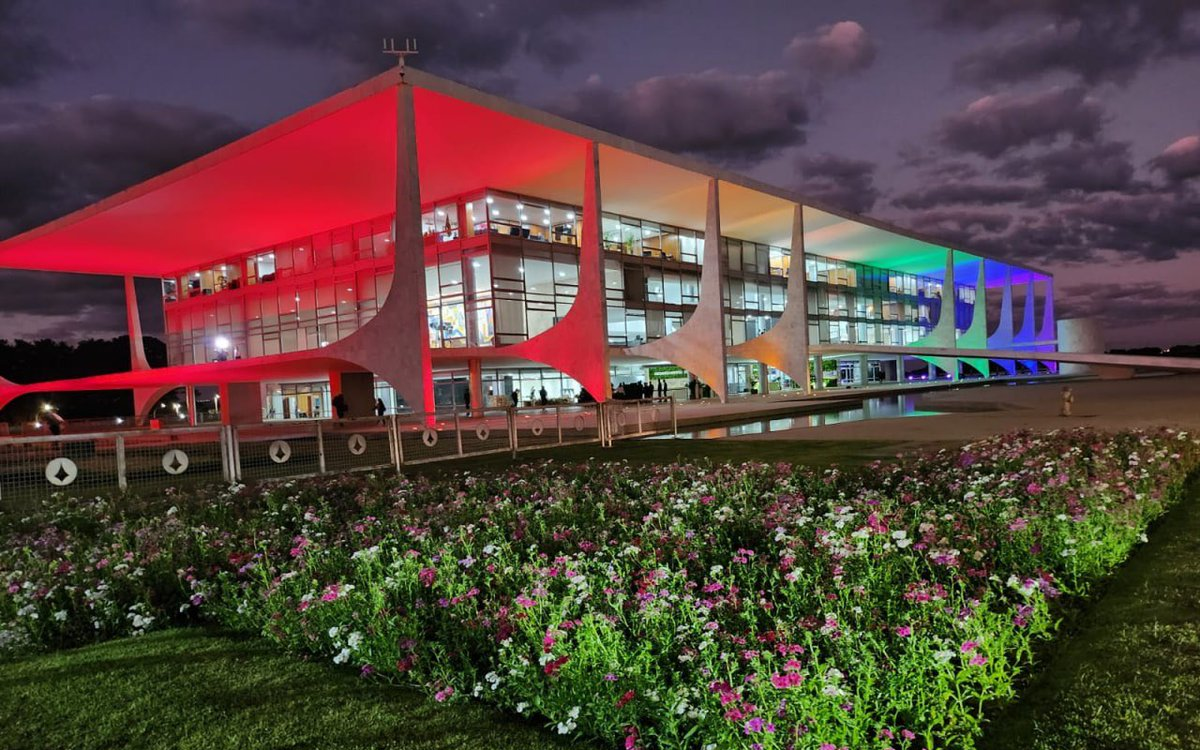
Congresswomen Erika Hilton and Duda Salabert, who are both transgender, won their respective elections last October.
Larrat, who said she is friends with both of them, told the Blade trans Brazilians still lack representation in the country’s political process. Larrat, however, did stress Hilton and Salabert’s election is an important step forward for the country.
“It’s still very little,” said Larrat. “We went from nothing to something.”

Colombia
Gay Venezuelan opposition leader: Country’s future uncertain after Maduro ouster
Yendri Velásquez fled to Colombia in 2024 after authorities ‘arbitrarily detained’ him

A gay Venezuelan opposition leader who currently lives in Colombia says his country’s future is uncertain in the wake of now former President Nicolás Maduro’s ouster.
The Washington Blade spoke with Yendri Velásquez on Thursday, 12 days after American forces seized Maduro and his wife, Cilia Flores, at their home in Caracas, the Venezuelan capital, during an overnight operation.
Maduro and Flores on Jan. 5 pleaded not guilty to federal drug charges in New York. The Venezuelan National Assembly the day before swore in Delcy Rodríguez, who was Maduro’s vice president, as the country’s acting president.
Velásquez, who lives in the Colombian capital of Bogotá, described the events surrounding Maduro’s ouster as “very confusing.”
“It was a very surprising thing that left me in shock,” Velásquez told the Blade. “We also thought, at least from the perspective of human rights, that the United States was going to respect international law and not go to the extreme of bombing and extracting Maduro.”
“Other questions also arise,” he added. “What could have been done? What else could have been done to avoid reaching this point? That is the biggest question posed to the international community, to other countries, to the human rights mechanisms we established before Trump violated international law, precisely to preserve these mechanisms and protect the human rights of Venezuelan people and those of us who have been forced to flee.”
Velásquez three years ago founded the Venezuelan Observatory of LGBTIQ+ Violence. He also worked with Tamara Adrián, a lawyer who in 2015 became the first openly transgender woman elected to the Venezuelan National Assembly, for more than a decade.
Members of Venezuela’s military counterintelligence agency, known by the Spanish acronym DGCIM, on Aug. 3, 2024, “arbitrarily detained” Velásquez as he was trying to leave the country to attend a U.N. human rights event in Geneva.
Velásquez told the Blade he was “forcibly disappeared” for nearly nine hours and suffered “psychological torture.” He fled to Colombia upon his release.
Two men on Oct. 14, 2025, shot Velásquez and Luis Peche Arteaga, a Venezuelan political consultant, as they left a Bogotá building.
The assailants shot Velásquez eight times, leaving him with a fractured arm and hip. Velásquez told the Blade he has undergone multiple surgeries and has had to learn how to walk again.
“This recovery has been quite fast, better than we expected, but I still need to finish the healing process for a fractured arm and complete the physical therapy for the hip replacement I had to undergo as a result of these gunshots,” he said.

María Corina Machado, who won the 2025 Nobel Peace Prize, and other Venezuelan opposition leaders said Maduro’s government targeted Velásquez and Peche. Colombian President Gustavo Petro and his government also condemned the attack.
Colombian authorities have yet to arrest anyone in connection with the attack.
Velásquez noted to the Blade he couldn’t sleep on Jan. 3 because “of the aches and pains” from the shooting. He said a friend who is “helping me out and looking after my things” was the one who told him about the operation the U.S. carried out to seize Maduro and Flores.
“He said, ‘Look at this! They’re bombing Caracas! And I was like, ‘What is this?'” recalled Velásquez.
White House ‘not necessarily’ promoting human rights agenda
Velásquez noted Rodríguez “is and forms part of the mechanisms of repression” that includes DGCIM and other “repressive state forces that have not only repressed, but also tortured, imprisoned, and disappeared people simply for defending the right to vote in (the) 2024 (election), simply for protesting, simply for accompanying family members.” Velásquez told the Blade that “there isn’t much hope that things will change” in Venezuela with Rodríguez as president.
“Let’s hope that countries and the international community can establish the necessary dialogues, with the necessary intervention and pressure, diplomatically, with this interim government,” said Velásquez, who noted hundreds of political prisoners remain in custody.
He told the Blade the Trump-Vance administration does not “not necessarily” have “an agenda committed to human rights. And we’ve seen this in their actions domestically, but also in their dealings with other countries.”
“Our hope is that the rest of the international community, more than the U.S. government, will take action,” said Velásquez. “This is a crucial moment to preserve democratic institutions worldwide, to preserve human rights.”
Velásquez specifically urged the European Union, Colombia, Brazil, and other Latin American countries “to stop turning a blind eye to what is happening and to establish bridges and channels of communication that guarantee a human rights agenda” and to try “to curb the military advances that the United States may still be considering.”

Velásquez told the Blade he also plans to return to Venezuela when it is safe for him to do so.
“My plan will always be to return to Venezuela, at least when it’s no longer a risk,” he said. “The conditions aren’t right for me to return because this interim government is a continuation of Maduro’s government.”
Editor’s note: International News Editor Michael K. Lavers was on assignment in Bogotá, Colombia, from Jan. 5-10.
Venezuela
AHF client in Venezuela welcomes Maduro’s ouster
‘This is truly something we’ve been waiting for’ for decades

An AIDS Healthcare Foundation client who lives in Venezuela told the Washington Blade he welcomes the ouster of his country’s former president.
The client, who asked the Blade to remain anonymous, on Thursday said he felt “joy” when he heard the news that American forces seized Nicolás Maduro and his wife, Cilia Flores, at their home in Caracas, the Venezuelan capital, during an overnight operation on Jan. 3.
“This is truly something we’ve been waiting for for 26 or 27 years,” the AHF client told the Blade.
Hugo Chávez became Venezuela’s president in 1999. Maduro succeeded him in 2013 after he died.
“I’ve always been in opposition,” said the AHF client, who stressed he was speaking to the Blade in his personal capacity and not as an AHF representative. “I’ve never agreed with the government. When I heard the news, well, you can imagine.”
He added he has “high hopes that this country will truly change, which is what it needed.”
“This means getting rid of this regime, so that American and foreign companies can invest here and Venezuela can become what it used to be, the Venezuela of the past,” he said.
The AHF client lives near the Colombia-Venezuela border. He is among the hundreds of Venezuelans who receive care at AHF’s clinic in Cúcuta, a Colombian city near the Táchira River that marks the border between the two countries.
The Simón Bolívar Bridge on the Colombia-Venezuela border on May 14, 2019. (Washington Blade video by Michael K. Lavers)
The AHF client praised U.S. President Donald Trump and reiterated his support for the Jan. 3 operation.
“It was the only way that they could go,” he said.
The Venezuelan National Assembly on Jan. 4 swore in Delcy Rodríguez, who was Maduro’s vice president, as the country’s acting president. The AHF client with whom the Blade spoke said he is “very optimistic” about Venezuela’s future, even though the regime remains in power.
“With Maduro leaving, the regime has a certain air about it,” he said. “I think this will be a huge improvement for everyone.”
“We’re watching,” he added. “The actions that the United States government is going to implement regarding Venezuela give us hope that things will change.”
Colombia
Colombians protest against Trump after he threatened country’s president
Tens of thousands protested the US president in Bogotá

BOGOTÁ, Colombia — Tens of thousands of people on Wednesday gathered in the Colombian capital to protest against President Donald Trump after he threatened Colombian President Gustavo Petro.
The protesters who gathered in Plaza Bolívar in Bogotá held signs that read, among other things, “Yankees go home” and “Petro is not alone.” Petro is among those who spoke.
The Bogotá protest took place four days after American forces seized now former Venezuelan President Nicolás Maduro and his wife, Cilia Flores, at their home in Caracas, the Venezuelan capital, during an overnight operation.
The Venezuelan National Assembly on Sunday swore in Delcy Rodríguez, who was Maduro’s vice president, as the country’s acting president. Maduro and Flores on Monday pleaded not guilty to federal drug charges in New York.
Trump on Sunday suggested the U.S. will target Petro, a former Bogotá mayor and senator who was once a member of the M-19 guerrilla movement that disbanded in the 1990s. Claudia López, a former senator who would become the country’s first female and first lesbian president if she wins Colombia’s presidential election that will take place later this year, is among those who criticized Trump’s comments.
The Bogotá protest is among hundreds against Trump that took place across Colombia on Wednesday.
Petro on Wednesday night said he and Trump spoke on the phone. Trump in a Truth Social post confirmed he and his Colombian counterpart had spoken.
“It was a great honor to speak with the president of Colombia, Gustavo Petro, who called to explain the situation of drugs and other disagreements that we have had,” wrote Trump. “I appreciated his call and tone, and look forward to meeting him in the near future. Arrangements are being made between Secretary of State Marco Rubio and the foreign minister of Colombia. The meeting will take place in the White House in Washington, D.C.”
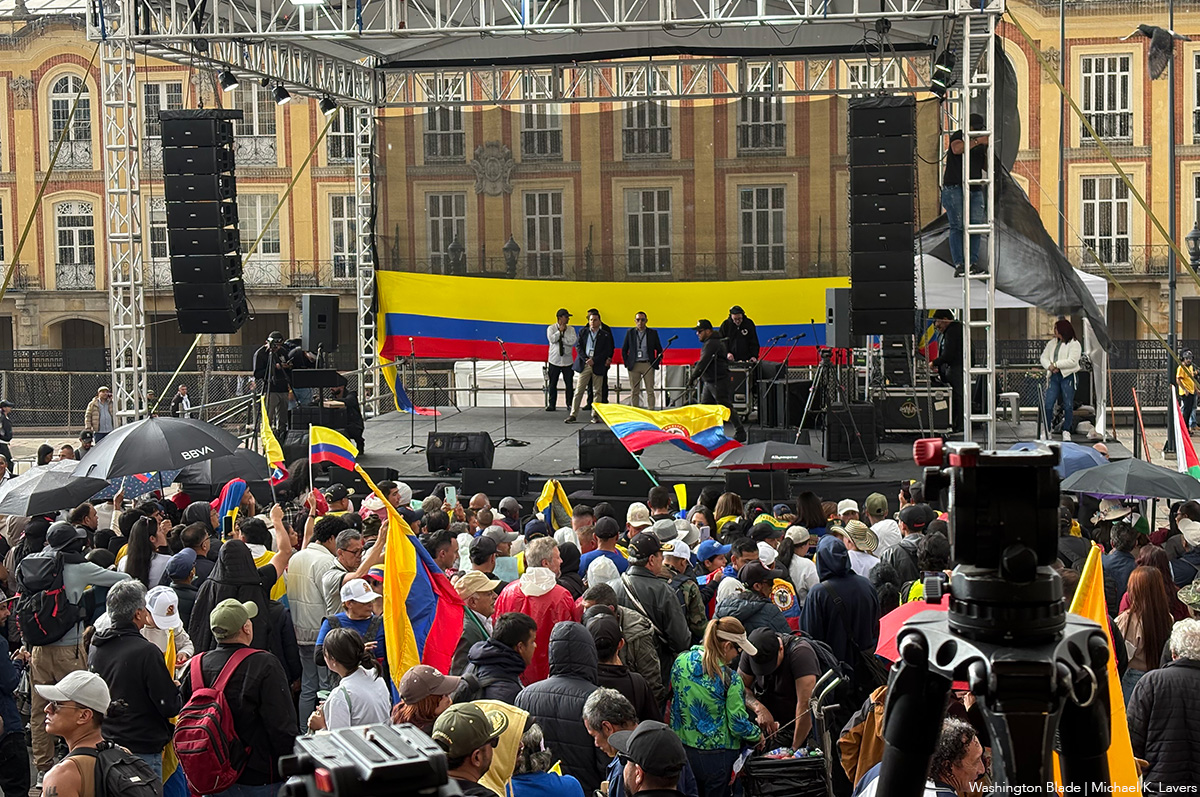
-

 Colombia5 days ago
Colombia5 days agoGay Venezuelan opposition leader: Country’s future uncertain after Maduro ouster
-

 Maryland5 days ago
Maryland5 days agoLayoffs and confusion at Pride Center of Maryland after federal grants cut, reinstated
-

 Opinions5 days ago
Opinions5 days agoDo not forget that Renee Good was queer
-

 Florida5 days ago
Florida5 days agoDNC slams White House for slashing Fla. AIDS funding



















